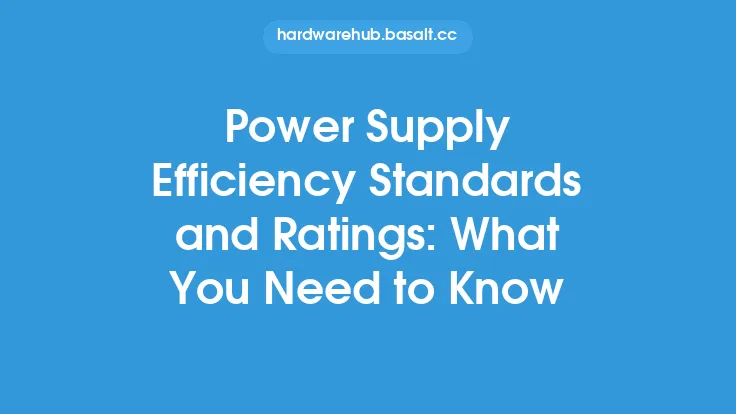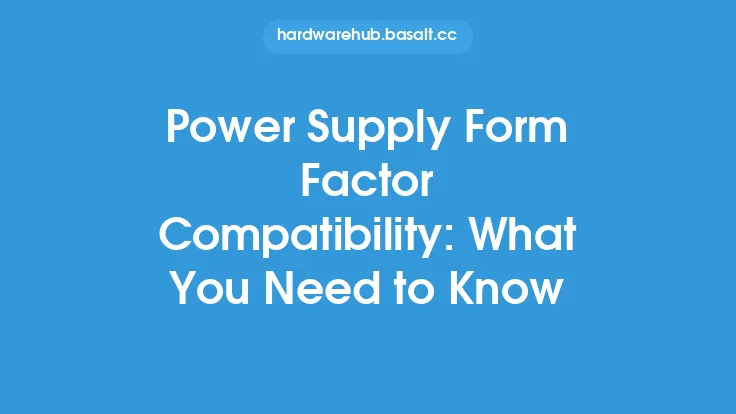When it comes to power supplies, certification is a crucial aspect that ensures the safety and performance of these devices. Among the various certifications available, CE and FCC certifications are two of the most widely recognized and respected. In this article, we will delve into the world of CE and FCC certification for power supplies, exploring what these certifications entail, their requirements, and the benefits they offer.
Introduction to CE Certification
CE certification is a mandatory requirement for power supplies sold in the European Economic Area (EEA). The CE mark indicates that the power supply complies with the essential health and safety requirements of the relevant European Union (EU) directives. The CE certification process involves a series of tests and evaluations to ensure that the power supply meets the required standards for safety, electromagnetic compatibility (EMC), and environmental protection. The CE mark is not a quality mark, but rather a declaration by the manufacturer that the power supply meets the minimum requirements for safety and performance.
Introduction to FCC Certification
FCC certification, on the other hand, is a requirement for power supplies sold in the United States. The Federal Communications Commission (FCC) is responsible for regulating the use of radio frequency (RF) energy in the US. The FCC certification process involves testing the power supply for electromagnetic interference (EMI) and ensuring that it does not exceed the allowed limits. The FCC certification is mandatory for power supplies that emit RF energy, such as those with switching frequencies above 9 kHz. The FCC mark indicates that the power supply complies with the FCC's regulations for EMI and RF safety.
Requirements for CE Certification
To obtain CE certification, power supply manufacturers must comply with the relevant EU directives, such as the Low Voltage Directive (LVD) and the Electromagnetic Compatibility Directive (EMCD). The LVD directive sets out the safety requirements for power supplies, including protection against electric shock, fire, and other hazards. The EMCD directive sets out the requirements for electromagnetic compatibility, including the limits for electromagnetic emissions and immunity. Manufacturers must also comply with the EU's RoHS (Restriction of Hazardous Substances) directive, which restricts the use of certain hazardous substances in power supplies.
Requirements for FCC Certification
To obtain FCC certification, power supply manufacturers must comply with the FCC's regulations for EMI and RF safety. The FCC requires power supplies to be tested for electromagnetic emissions and immunity, and to meet the allowed limits for RF energy. The FCC also requires power supplies to be labeled with the FCC ID, which is a unique identifier assigned to the power supply by the FCC. Manufacturers must also comply with the FCC's regulations for RF exposure, which set out the limits for human exposure to RF energy.
Testing and Certification Process
The testing and certification process for CE and FCC certification involves a series of tests and evaluations to ensure that the power supply meets the required standards. The tests include electromagnetic compatibility (EMC) testing, safety testing, and environmental testing. The EMC testing involves measuring the power supply's electromagnetic emissions and immunity, while the safety testing involves evaluating the power supply's protection against electric shock, fire, and other hazards. The environmental testing involves evaluating the power supply's performance in different environmental conditions, such as temperature and humidity.
Benefits of CE and FCC Certification
CE and FCC certification offer several benefits to power supply manufacturers and users. The CE mark indicates that the power supply meets the minimum requirements for safety and performance, while the FCC mark indicates that the power supply complies with the FCC's regulations for EMI and RF safety. CE and FCC certification also provide a competitive advantage, as they demonstrate a commitment to safety and quality. Additionally, CE and FCC certification can facilitate international trade, as they are recognized and respected worldwide.
Conclusion
In conclusion, CE and FCC certification are essential requirements for power supplies sold in the European Economic Area and the United States, respectively. These certifications ensure that power supplies meet the required standards for safety, electromagnetic compatibility, and environmental protection. The testing and certification process involves a series of tests and evaluations to ensure that the power supply meets the required standards. The benefits of CE and FCC certification include a competitive advantage, facilitation of international trade, and demonstration of a commitment to safety and quality. By understanding the requirements and benefits of CE and FCC certification, power supply manufacturers can ensure that their products meet the required standards and are safe for use.





